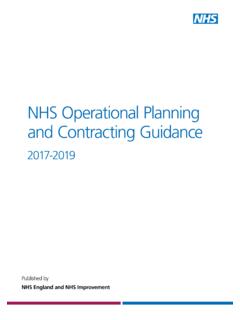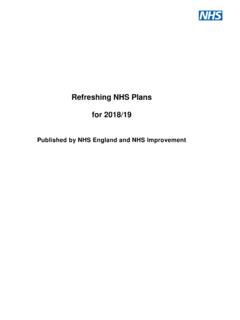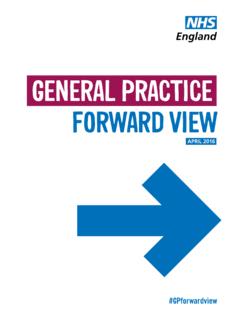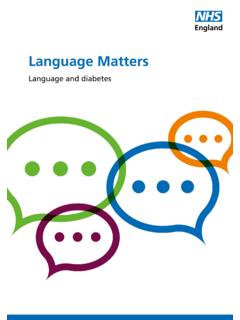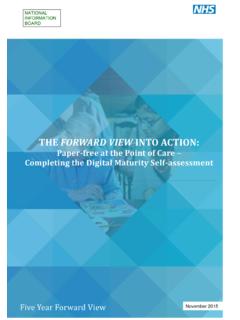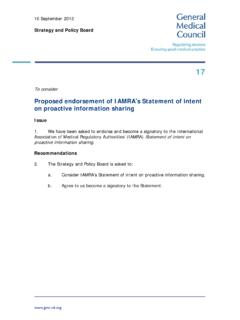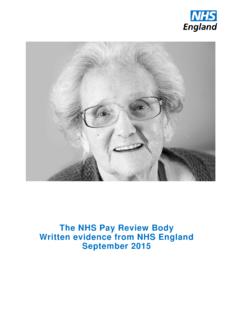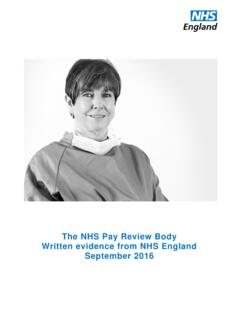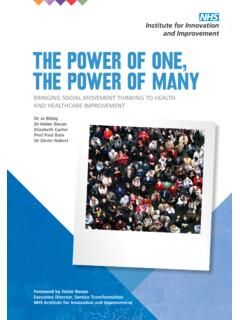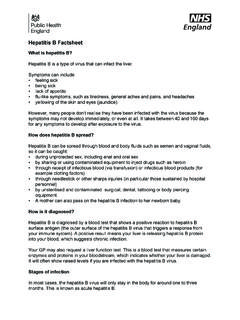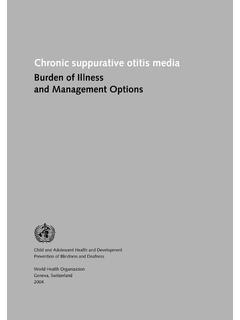Transcription of Action Plan on Hearing Loss - NHS England
1 Action plan on Hearing loss OFFICIAL 2 NHS England INFORMATION READER BOXD irectorateMedicalPublications Gateway Reference:03073 Document PurposeDocument NameAuthorPublication DateTarget AudienceAdditional Circulation ListDescriptionCross ReferenceAction RequiredTiming / Deadlines(if applicable) Action plan on Hearing LossSuperseded Docs(if applicable)Contact Details for further informationDocument StatusSE1 6 HLThis is a controlled document. Whilst this document may be printed, the electronic version posted on the intranet is the controlled copy. Any printed copies of this document are not controlled. As a controlled document, this document should not be saved onto local or network drives but should always be accessed from the intranet.
2 NB: The NHS Commissioning Board (NHS CB) was established on 1 October 2012 as an executive non-departmental public body. Since 1 April 2013, the NHS Commissioning Board has used the name NHS England for operational purposes. Guidance80 London RoadLondonProfessor Sue Hill OBE, Chief Scientific OfficerMedical DirectorateNHS EnglandSkipton HouseThe purpose of the Action plan on Hearing loss report is to encourage Action and promote change across all levels of public service. It identifies how Hearing needs can be met and improved for children and England and Department of Health23rd March 2015 CCG Clinical Leaders, CCG Accountable Officers, CSU Managing Directors, Foundation Trust CEs , Medical Directors, Directors of PH, Local Authority CEs, NHS Trust Board Chairs, NHS England Regional Directors, NHS England Directors of Commissioning Operations, Allied Health Professionals, GPs, Directors of Children's Services, NHS Trust CEs#VALUE!
3 N/AN/AN/A OFFICIAL 3 Action plan on Hearing loss Version number: Final Draft First published: 23rd March 2015 Prepared by: Professor Sue Hill, OBE, Chief Scientific Officer, Kevin Holton, Deputy Director, Patient Experience, Cathy Regan, Associate Consultant, Primary Care Commissioning Classification: (OFFICIAL) OFFICIAL 4 Contents 1 Foreword .. 5 2 Executive summary .. 6 3 The Case for Action .. 8 4 What Children, Young People, Adults and their Families and Carers Want .. 15 5 What Action needs to be Taken .. 18 Appendix 1 - The House of Care Model .. 26 Appendix 2 - Improving the Patient Experience - Initiatives supported by NHS England .. 30 Appendix 3 - The Life Course Appendix 4 - Roles and Responsibilities of Government Departments and other Agencies on Hearing loss .
4 34 Appendix 5 - The Hearing Needs of the Armed Forces Community .. 41 OFFICIAL 5 1 Foreword Most of us take our Hearing for granted, but Hearing loss affects over 10 million adults and 45, 000 children in the UK. This equates to 1 in 6 of the population and has an enormous personal, social and economic impact (1). It will continue to become an even bigger challenge over the next decade as the number and proportion of older people increases and with increasing exposure to workplace and social noise such as MP3 players. By 2031, it is estimated that million people in the UK, approximately 20% of the population, will have a Hearing loss (2). There are also different groups of the population that are more affected than others, such as older people and veterans.
5 Hearing loss affects those both born deaf and those who acquire it later in life, and whilst there has been substantial progress in improving the health services available to children, young people and adults over the last ten years, significant challenges remain (3). More needs to be done on prevention, early diagnosis and support for those who have permanent Hearing loss . A particular challenge is meeting the Hearing needs of the rapidly growing older population. million older people (aged over 65) in England have a Hearing loss and this will have a disproportionate effect on their wider physical and mental health, independence and ability to work. Moreover, Hearing loss is not just a health issue it is societal and requires an integrated approach across a range of government departments, non-departmental public bodies and stakeholder organisations across the public, private and third sectors, including children, young people and adults with Hearing loss themselves.
6 The purpose of this document is to encourage Action and promote change across all public service sectors and at all levels on how children s, young people s, working age adults and older people s Hearing needs can best be met. The Action plan has been developed with input from the Department of Health, NHS England , Public Health England , other Government Departments, key stakeholders across the voluntary, professional and private sectors and people with Hearing loss . It is intended to provide a rallying call to all those involved to deliver improved Hearing outcomes and support for individuals and the population at whatever level they operate. NHS England , the Department of Health, Public Health England , other Government Departments and stakeholders within the Hearing loss community are committed to achieving this and will work together to ensure progress is made on all the stated objectives and actions.
7 Bruce Keogh NHS Medical Director OFFICIAL 6 2 Executive summary This Action plan on Hearing loss sets out a case for Action to tackle the rising prevalence and personal, social and economic costs of uncorrected Hearing loss and the variation in access and quality of services experienced by people with Hearing loss . Aligned with NHS England s Five Year Forward View1, it proposes addressing this growing challenge by promoting prevention of Hearing loss , improving both the commissioning and integration of services, providing innovative models of care and ensuring that people of all ages with Hearing loss are actively supported and empowered to lead the lives they want for themselves and their families in the best possible health.
8 Leading to reduced inequalities in access to services and the outcomes achieved. To achieve this it is crucial for the health service and other public services to deliver what matters to people with deafness and Hearing loss and the actions required are derived in part, from what people with Hearing loss , their families and carers have identified as important. This includes: Reducing the stigma related to having a Hearing loss ; Designing public services and public spaces to support good communication; Providing better communication support and understanding in the workplace, including timely access to assistive devices, language support (for example British Sign Language (BSL) or Signed Supported English) and speech-to-text; Undertaking more research into the causes of and management of Hearing loss and tinnitus; Promoting strategies for the prevention of Hearing loss , and an understanding of Hearing awareness; Encouraging early awareness, diagnosis and management of Hearing loss .
9 Person-centred planning, which is responsive to information and social needs; Providing timely access or signposting to communication support, lip-reading classes, Hearing therapy or counselling, support groups, befriending services and assistive technologies; Promoting inclusion and participation, by ensuring that all public services are accessible and support language and communication needs. The Action plan frames its objectives in the principles underlying the Life Course Model adopted by the Chief Medical Officer in her 2012 annual report (4) and the House of Care approach supported by NHS England , which promotes person centred, coordinated care in partnership with health and care professionals for people with long term conditions.
10 The Action plan sets out five key objectives which support implementation of the NHS Outcomes Framework 2014/152 and specific business areas within NHS England s business plan for 2014/15 2016/173 including: Prevention 1 2 Department of Health (2013): NHS Outcomes Framework 2014/15 3 NHS England : Putting Patients First Business plan 2014/15-2016/17 OFFICIAL 7 Early diagnosis Integrated, patient centred management Ensuring those diagnosed do not need unscheduled care or become isolated Ability to partake in every-day activities including work. It is not intended to act as a detailed implementation plan , but it proposes an integrated and more effective approach to managing Hearing loss by emphasising investment in risk reduction through prevention with earlier awareness, diagnosis and timely support and management.
